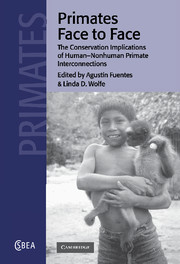Book contents
- Frontmatter
- Contents
- List of contributors
- Foreword
- Acknowledgements
- Introduction
- Part 1 Science and nonhuman primates
- Part 2 Cultural views of nonhuman primates
- 4 Monkey as food, monkey as child: Guajá symbolic cannibalism
- 5 Ethnoecology of monkeys among the Barí of Venezuela: perception, use and conservation
- 6 Primates in Matsigenka subsistence and world view
- 7 Monkey King in China: basis for a conservation policy?
- 8 Reflections on the concept of nature and gorillas in Rwanda: implications for conservation
- Part 3 Conservation of nonhuman primates
- Part 4 Government actions, local economies and nonhuman primates
- Index
7 - Monkey King in China: basis for a conservation policy?
Published online by Cambridge University Press: 20 October 2009
- Frontmatter
- Contents
- List of contributors
- Foreword
- Acknowledgements
- Introduction
- Part 1 Science and nonhuman primates
- Part 2 Cultural views of nonhuman primates
- 4 Monkey as food, monkey as child: Guajá symbolic cannibalism
- 5 Ethnoecology of monkeys among the Barí of Venezuela: perception, use and conservation
- 6 Primates in Matsigenka subsistence and world view
- 7 Monkey King in China: basis for a conservation policy?
- 8 Reflections on the concept of nature and gorillas in Rwanda: implications for conservation
- Part 3 Conservation of nonhuman primates
- Part 4 Government actions, local economies and nonhuman primates
- Index
Summary
Overview
All peoples construct ‘nature’. The division of human FROM nature is such a construct; the development of humanity as controller of nature is enshrined in the myths, legends and religious tales from all over the world. Nowhere, perhaps, is this theme more clearly presented than in the myth of Monkey King, Sun M'Hong (Cantonese) or Sun WuKong (Mandarin). Although his character and some of his exploits may derive from the great Hindu being Hanuman, his development throughout the ancient novel The Journey to the West metaphorically addresses the development of humanity in its conscious striving towards a higher state. The obvious physical similarity between monkey and human also serves as reminder of the fragile distance between humans and nature. Traditional respect for monkeys owes much to the place of Monkey King in cultural thinking.
In 1984, when I first surveyed the hybrid macaques of Hong Kong, many of the traditional values were very much in evidence. Gifts to Sun WuKong were made through his mortal manifestations; Buddhism, in its devotion of Fang Sheng, encouraged the release of monkeys into the forest and courtesies towards them in the form of gifts of fruits and vegetables. Times change, and the ambience that fosters appreciation for wildlife amongst humans redefines its values in terms of competition for scarce resources, especially land.
- Type
- Chapter
- Information
- Primates Face to FaceThe Conservation Implications of Human-nonhuman Primate Interconnections, pp. 137 - 162Publisher: Cambridge University PressPrint publication year: 2002
- 10
- Cited by



